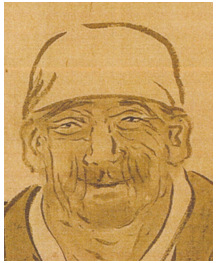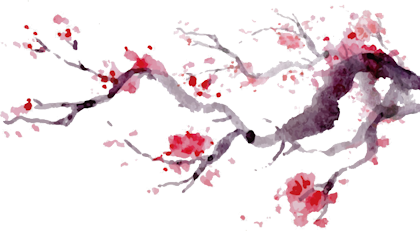Basho's thoughts on...
Matsuo Basho 1644~1694

The only substantial
collection in English
of Basho's renku, tanka,
letters and spoken word
along with his haiku, travel
journals, and essays.
The only poet in old-time
literature who paid attention with praise
to ordinary women, children, and teenagers
in hundreds of poems
Hundreds upon hundreds of Basho works
(mostly renku)about women, children,
teenagers, friendship, compassion, love.
These are resources we can use to better
understand ourselves and humanity.
Interesting and heartfelt
(not scholarly and boring)
for anyone concerned with
humanity.
“An astonishing range of
social subject matter and
compassionate intuition”
"The primordial power
of the feminine emanating
from Basho's poetry"
Hopeful, life-affirming
messages from one of
the greatest minds ever.
Through his letters,
we travel through his mind
and discover Basho's
gentleness and humanity.
I plead for your help in
finding a person or group
to take over my 3000 pages of Basho material,
to edit and improve the material, to receive 100%
of royalties, to spread Basho’s wisdom worldwide
and preserve for future generations.
Quotations from Basho Prose
The days and months are
guests passing through eternity.
The years that go by
also are travelers.
The mountains in silence
nurture the spirit;
the water with movement
calms the emotions.
All the more joyful,
all the more caring
Seek not the traces
of the ancients;
seek rather the
places they sought.
basho4humanity
@gmail.com
Plea for Affiliation
Plea For Affiliation
I pray for your help
in finding someone
- individual, university,
or foundation -
to take over my
3000 pages of material,
to cooperate with me
to edit the material,
to receive all royalties
from sales, to spread
Basho’s wisdom worldwide,
and preserve for
future generations.
basho4humanity
@gmail.com
About Basho4Humanity
Basho’s several hundred poems about women children, friendship, love, and compassion are almost entirely unknown both in Japan and the West yet may be the most pro-female, child-centered, and life-affirming works in world literature.
Comments on Basho4Humanity:
…the astonishing range of social subject matter and compassionate intuition that Basho reveals in his links.
Michele Root-Bernstein Ph.D
Department of Theater
Michigan State University
The casual, often irreverent humor and utterly likeable voice of the narrative make it irresistible reading. It is easy to imagine intelligent readers of many ages and walks of life enjoying this loving meditation on Basho.
“(this book) welcomes us into… a deeper understanding of this great poet’s humanity, and in particular, of his clear respect, affection, and even reverence, for women.”
Your fresh treatment of Basho’s poem, paired with the upstart voice that welcomes us to relax and enjoy their tenderness, should easily find audiences who appreciate your quirky, stream-of-consciousness approach.
Ceci Miller
Editorial Consultant
Seattle Washington
I particularly enjoyed Jeff Robbins’ insightful new translations of some of Basho’s haiku. I have always felt haiku to be a uniquely Japanese form of expression which I have just not been able to understand. However through Robbins’ careful and beautifully thought-out translations and explanations, the art has suddenly become more animated, which was a surprising and unforeseen outcome when I first picked up the book.
Harry Martin
Japan Society of the UK
Jeff Robbins
I am an American who has lived in Japan for three decades; the company I created, Asabo Workshop, designs, builds, and sells developmental play equipment for children. I have studied and translated Basho for more than thirty years as a hobby, without university affiliation.
I am amazed that Basho is the most famous of all Japanese poets, yet so, so much of his work is unknown both in Japan and the West. It appalls me that his magnificent observations of humanity are unknown to humanity, are not taught in schools, do not appear in books and journals, are not cited by historians, sociologists, anthropologists worldwide. In this world of so much negativity and sensationalism, we need Basho’s positive, life-affirming works to remind us of what Sam (Sean Astin) said in the Lord of the Rings:
There’s some good in the world
and it’s worth fighting for.
There is much good in Basho and it’s worth fighting to overcome the judgments of Basho -- “literary”, “impersonal”, “old,” “lonely” -- by people who have no knowledge at all of his works on humanity. I hope you will communicate with me any ways you can help distribute the material in the 153 articles of Basho4Humanity.
Jeff Robbins
Sakata Shoko
Sakata Shoko is a certified Instructor in Japanese Language, and mother of two small daughters. She corrects my countless misunderstandings of her language, helps me recognize the meanings only a native Japanese can see, searches for information on the Japanese Internet and in her electronic encyclopedia, and in Professor Kon’s commentaries.
One day she said, “When I was in high school. I knew Basho was great, but I never thought his haiku had anything to do with my life.” So I asked her, after all her recent study and translating of Basho, what does she think now? Shoko replied:
“Students learn Basho and some other poets as part of History of Japanese Literature, then recite some of their famous verses for an exam. We have nothing more than this. We don’t appreciate it, don’t see where and how they lived. And haiku was just an art, not part of life.
Now I know some of his background and feel a sort of affinity. He was a human being like me, who lived with passion for literature. My image has changed from Haiku Saint Basho to dear Uncle Basho. I think this is important to appreciate the verses. Now I feel one verse is funny, the others are serious, and some are interesting. I can sympathize with his works. I say to high school teachers, should we understand the Haiku Saint’s humanity, not only for exams, but also for diffusing haiku towards younger people?
Now some flowers, trees, weather, foods, and people too, remind me of his connected haiku. Basho has become a familiar part of my life, which is just fun.”
Basho's thoughts on...
Matsuo Basho 1644~1694

The only substantial
collection in English
of Basho's renku, tanka,
letters and spoken word
along with his haiku, travel
journals, and essays.
The only poet in old-time
literature who paid attention with praise
to ordinary women, children, and teenagers
in hundreds of poems
Hundreds upon hundreds of Basho works
(mostly renku)about women, children,
teenagers, friendship, compassion, love.
These are resources we can use to better
understand ourselves and humanity.
Interesting and heartfelt
(not scholarly and boring)
for anyone concerned with
humanity.
“An astonishing range of
social subject matter and
compassionate intuition”
"The primordial power
of the feminine emanating
from Basho's poetry"
Hopeful, life-affirming
messages from one of
the greatest minds ever.
Through his letters,
we travel through his mind
and discover Basho's
gentleness and humanity.
I plead for your help in
finding a person or group
to take over my 3000 pages of Basho material,
to edit and improve the material, to receive 100%
of royalties, to spread Basho’s wisdom worldwide
and preserve for future generations.
Quotations from Basho Prose
The days and months are
guests passing through eternity.
The years that go by
also are travelers.
The mountains in silence
nurture the spirit;
the water with movement
calms the emotions.
All the more joyful,
all the more caring
Seek not the traces
of the ancients;
seek rather the
places they sought.
basho4humanity
@gmail.com
Plea for Affiliation
Plea For Affiliation
I pray for your help
in finding someone
- individual, university,
or foundation -
to take over my
3000 pages of material,
to cooperate with me
to edit the material,
to receive all royalties
from sales, to spread
Basho’s wisdom worldwide,
and preserve for
future generations.
basho4humanity
@gmail.com



